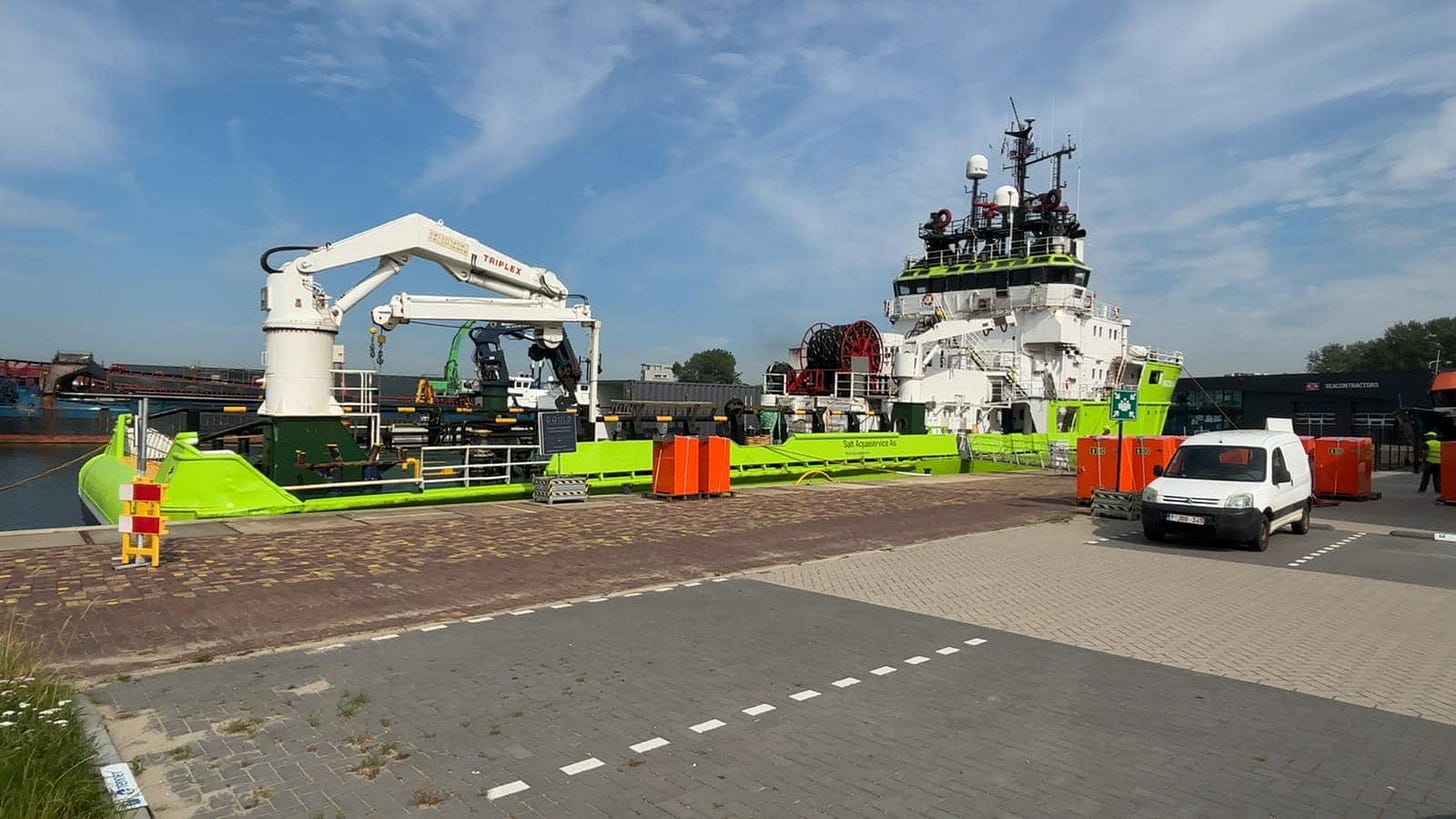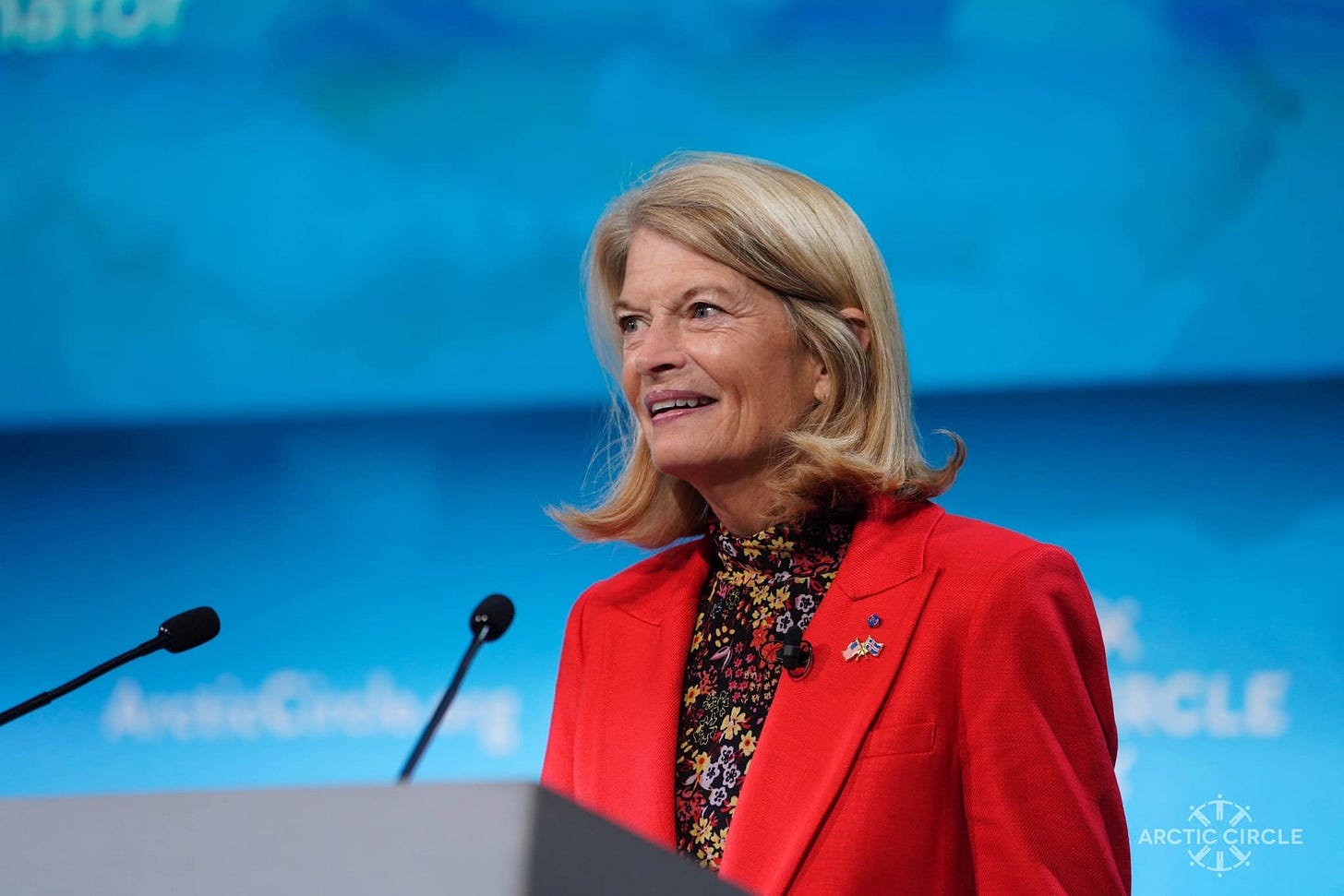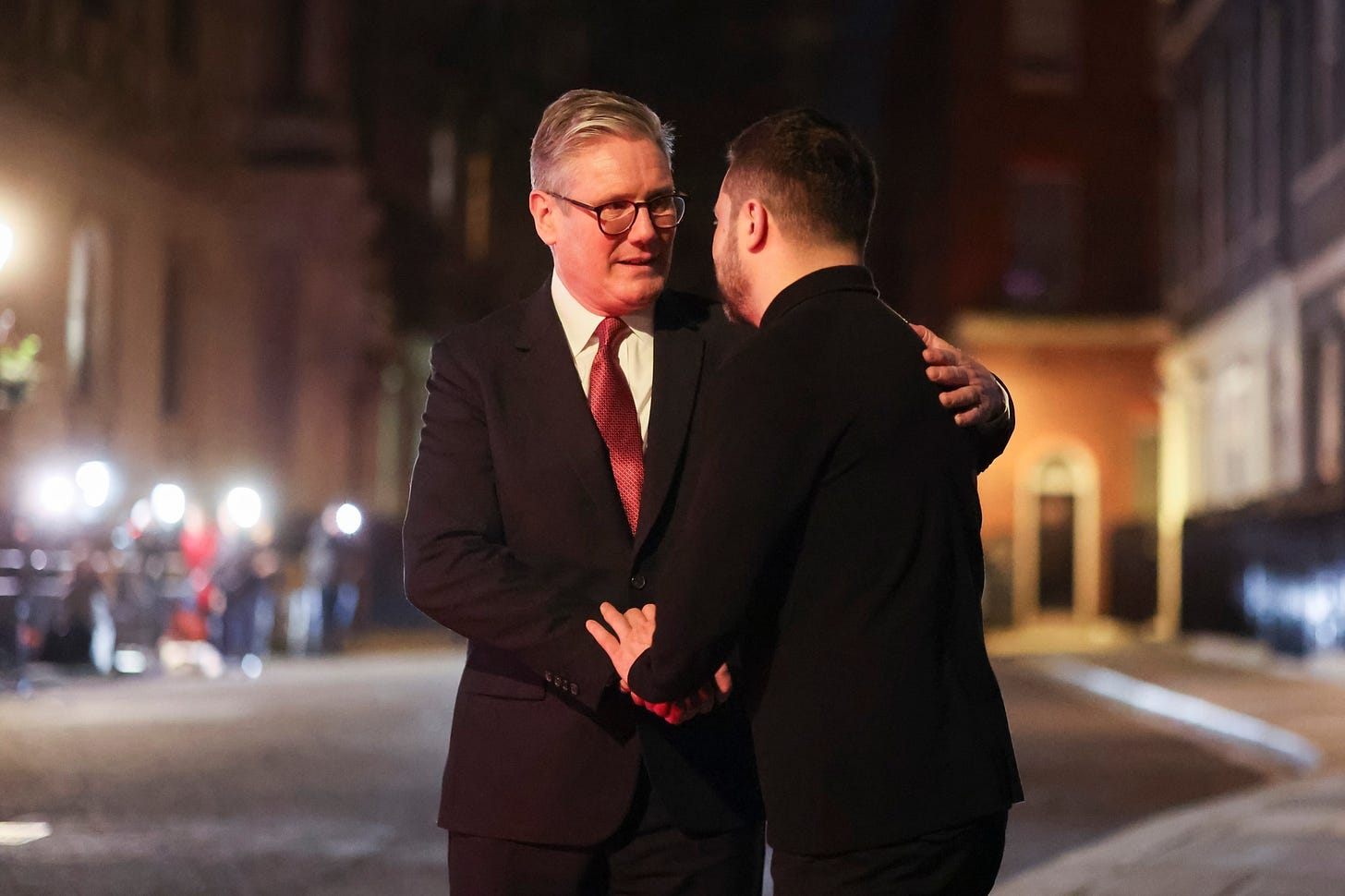What I'm Reading: The Oval Office fallout
February 28: Five reads that piqued my interest this week
Starmer’s choice looms
There has been a fair bit of hindsight criticism of Sir Keir Starmer’s visit to Washington DC, and his ‘fawning’ over Donald Trump, following the televised gang-up of Trump and his wolf warrior vice president JD Vance on Ukraine’s President Volodomyr Zelensky in the Oval Office on Friday.
I disagree. When Downing Street revealed that the UK Prime Minister had called Trump and Zelensky straight after the horror show, it underlined the potential Britain has to play in helping resolve the catastrophic fallout between Ukraine and the US. Starmer spoke with Trump again on Saturday.
The UK’s glory days on the global stage are undoubtedly well behind it. This was exacerbated by Brexit, despite what the Brexiteers say. But this is a unique moment for post-Brexit Britain to finally exploit being outside of the EU in trying to appeal to Trump, holding the keys to some of the few things Trump seems to genuinely care about, the Royal Family and the UK’s historic pomp, grandeur and ceremony and so on.
Any bridge Britain can provide is vital at this point. But we shouldn’t pretend it is anything more than what it is. Right now, Starmer has been able to host Zelensky, get him a meeting with the King on Sunday morning and convene a dozen or so European leaders for a summit on Sunday on where to now for the peace negotiations.
This raises the big question: was Friday’s rupture fixable or is the peace negotiation one that leaves Europe fighting with Ukraine against a Russia that has not just North Korea, China and Iran on its side but also a sympathetic Trump Administration?
Patrick Wintour, always a must-read in my book, picks this up.
At this distance, it does not matter if it was an ambush designed to belittle Zelenskyy in the mind of Republican America, or something that evolved into a vicious takedown. What matters is that the anger reflects Trump’s true feelings towards Ukraine, his faith in Putin and his belief that Zelenskyy does not warrant his support.
In one set of judgments, it marks the end of the post-1945 world order. The US may no longer be a trusted ally, but a competitor, even a strategic threat. It leaves Europe feeling even more alone than at the end of the Munich Security Conference when Vance portrayed Europe’s leaders as a threat alongside Russia and China.
Indeed, after the trio of Oval Office meetings with Macron, Starmer and Zelenskyy, it is an illusion to think that Trump can be motivated by any sense of shared history or common values.
…
Only Giorgia Meloni, now under growing domestic political pressure to break from Trump, wants to see if the relationship can be restored. The Italian prime minister said: ‘What is needed is an immediate summit between the United States, the European states and the allies to talk frankly about how we intend to face the great challenges of today, starting with Ukraine, which we have defended together in recent years.’
Either way, the US is determined to end the freeze in its bilateral relations with Russia. Europe is now alone in its conflict with Russia, and the US may not even play the role of a neutral bystander. Somehow, this disparate continent has to decide if it has the strength and cohesion to do what is required to force Moscow’s retreat.
For Starmer, the choice between Europe and the US – one he has sought to avoid – comes ever closer.
The mood in Kyiv
Naturally, the instant reaction in Ukraine has been to rally around Zelensky.
But as I watched that footage unfold, it was clear it would be an uphill, perhaps insurmountable, battle for Zelensky to mend ties with Trump, and we know that American support for Ukraine is critical to its sovereignty.
If the goal of Mr Trump and Mr Vance was to undermine the Ukrainian president’s support among ordinary citizens, it seems to have backfired, at least for now. Mr Zelensky’s emotional stand might have been unwise, but it has touched many in a nation hurting from war. Even those historically opposed to the president took to social media overnight to praise him for standing up for the country. Some Ukrainians have even started a collection for a nuclear bomb. Ukraine is not in any position to produce such a weapon even if it wanted to: it is a decade away from the facilities needed for enrichment. But that did not stop the pot reaching 22.75m hryvnia ($550,000) in the space of a few hours.
Far from everyone in the elite is convinced, however. One business leader talks of disbelief and shock at the White House standoff. Another source, the former diplomat, says it brought no winners except for Mr Putin: ‘The true issue now is how and when exactly the dust will settle down for Ukraine’s survival as a sovereign independent state.’
An opposition MP admits surprise at the reaction of many colleagues in parliament, where, he says, most publicly welcomed the president’s conduct. ‘Beyond the foolishness and disgrace, what shocks me most is that intelligent people are praising the president and criticising those who had the courage to call it a disaster.’ That assessment would change once initial emotions die down, he adds.
…
An exit by Mr Zelensky, or his removal by others, would be fraught during war time, and could plunge the country into chaos. Polling shows that there is nowhere near a majority in support of elections, which would require an end to martial law in turn making it difficult for Ukraine to remain mobilised and united.
One less painful way to conjure up an alternative leader for the purposes of negotiation might be to vote in a new parliamentary speaker, officially the second-most senior politician in Ukraine. According to this theory, they could then interact with the Trump administration. Doing that, however, would require Mr Zelensky’s acquiescence. It is also far from clear that the Ukrainian public wants it.
Trump’s openly pro-Putin comments
One of the most revealing parts of Friday’s tirade against Zelensky came right at the end when Trump exploded after being asked by a journalist what if Russian President Vladimir Putin broke a ceasefire.

It was here Trump said that Putin would never break a deal made with him personally: ‘Let me tell you, Putin went through a hell of a lot with me. He went through a phony witch hunt,’ Trump said.
This really jumped out — the level of personal attachment to a shared trauma or experience — seemed unnaturally high in the way Trump said it.
Arthur Snell, a former British diplomat who works at a risk consultancy firm with former British spy Christopher Steele — author of the infamous Steele dossier which made sensational, unverified claims about Trump’s relationship with Russia, including that footage of him being peed upon existed — has taken a fresh look at Trump’s Russia links.
Earlier this month, Alnur Mussayev, a retired Kazakh intelligence official who had been in the Soviet-era KGB claimed that Trump had been recruited by the agency in the 1980s and given the codename Krasnov. (It is a fairly common name in Russia which means ‘red’ - is this an allusion to Trump’s orange skin?)
I don’t give too much credence to these claims - why would only one person have come forward with this information up to this point? Why did it only emerge now? Given that Ukraine had every incentive to release this during the Biden years and there is considerable Ukrainian infiltration of Russia’s intelligence services, it seems unlikely that the only person in the know is an ageing Kazakh.
In 2021, Yuri Shvets, a former KGB officer, claimed that Trump had been ‘under cultivation’ by the KGB since 1987 (the date of his first Russia visit). Shvets is a far more serious source than Mussayev and many other things he has provided information on have proved correct, such as the events surrounding the assassination in London of former KGB intelligence officer Alexander Litvinenko.
It’s important to understand that what Shvets has said is not the same as saying that Trump was a ‘recruited’ asset: the allegation is not that he had consciously agreed to work for the Russians, taking instructions and so forth, but that he was regarded as ‘extremely vulnerable intellectually, and psychologically, and he was prone to flattery.’
This assessment appears entirely accurate and reflects the way he is handled by friend and foe alike (look at Starmer and Macron’s recent meetings). This sort of ‘asset’ is generally described as an ‘agent of influence’: someone who can be manipulated into helping Russia by a combination of ego, vanity and naked self-interest.
Norweigan fuel company blocks US warships
The Norweigan fuel company Haltbakk Bunkers said it would stop refuelling US warships as a result of Trump and Vance’s treatment of Zelensky.

In a strongly worded statement, the company criticised a televised event involving US President Donald Trump and Vice President JD Vance, referring to it as the ‘biggest shitshow ever presented live on TV.’
Haltbakk Bunkers praised Ukrainian President Volodymyr Zelensky for his restraint, accusing the U.S. of ‘putting on a backstabbing TV show’ and declaring that the spectacle ‘made us sick.’
As a result, the company stated: ‘We have decided to immediately STOP as fuel provider to American forces in Norway and their ships calling Norwegian ports. No Fuel to Americans!’ Haltbakk Bunkers also urged Norwegians and Europeans to follow their lead, concluding their statement with the slogan ‘Slava Ukraina’ in support of Ukraine.
Lone Republican protest
One of the more gobsmacking developments has been the White House issuing press statements for two days running now, listing all the Republicans who have lined up to tweet support and praise of Donald Trump and JD Vance.

Just one Republican is set not to make the cut.
This week started with administration officials refusing to acknowledge that Russia started the war in Ukraine.
It ends with a tense, regrettable conversation in the Oval Office and whispers from the White House that they may try to end all US support for Ukraine.
I know foreign policy is not for the faint of heart, but right now, I am sick to my stomach as the administration appears to be walking away from our allies and embracing Putin, a threat to democracy and US values around the world.
And that’s my list for this edition.
Last Saturday, I joined Times Radio to discuss the week in British politics. On Sunday, I joined Emma Nelson on Monocle Radio to discuss the week in geopolitics, the masculinity crisis and makeup that your stores discontinue, and on Wednesday, I was back at Midori House to speak to Andrew Mueller for Moncole Radio’s The Daily.
Please do send me anything that’s caught your eye, I enjoy knowing what you’ve been reading.
Some of you have started to offer me copies of your books etc. Please email me at latika@latikambourke.com for a forwarding address for hard copies.
To receive my stories and thoughts that I don’t Substack, please consider following my WhatsApp and Telegram Channels, as well as on X, Facebook, Instagram, Threads, Bluesky and LinkedIn.





Latika - totally agree with your analysis. Domestically makes other UK political parties impotent in the short term on Foreign Affairs. UK must pivot to Europe and forget about being a player in Indo-China. In Australia we need to concentrate on alliances with regional military powers like Japan, S Korea, Singapore and work hard on US. UK might drop out of AUKUS except maybe as a weapons supplier. To me the bad actors in all of this are Putin and J D Vance whose populist,Christian Nationalist ideology is a real threat to everyone in Australia (except Hillsong disciples)